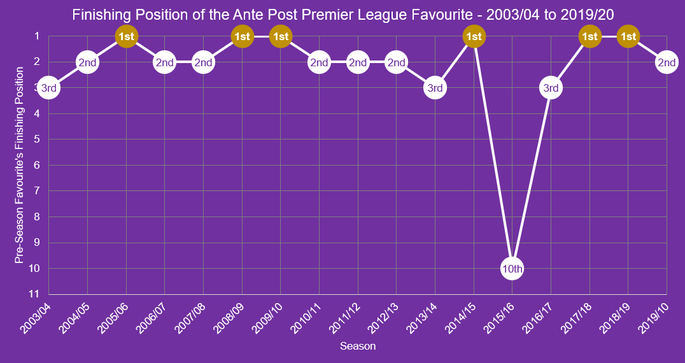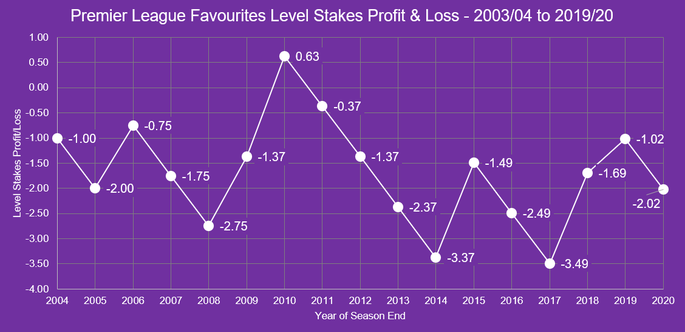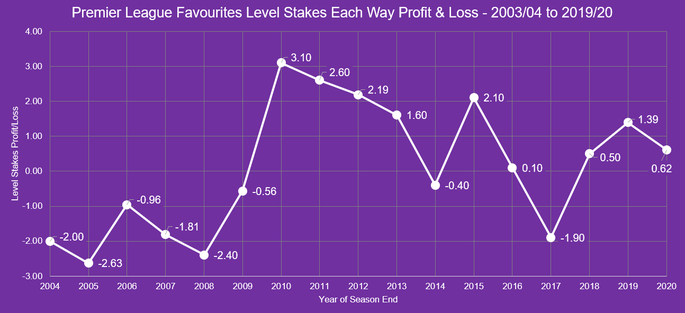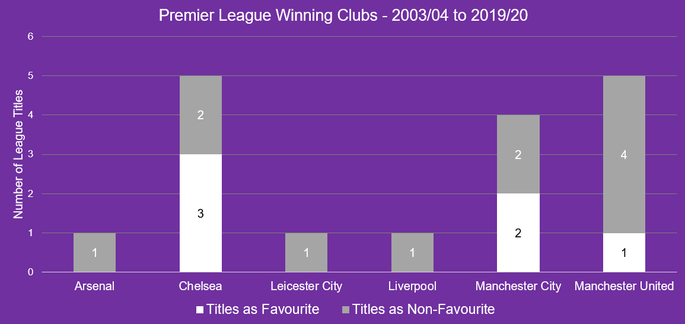
By Norio Nakayama, flickr
There are some sports, such as certain horse races, where there are plenty of variables to mean that a favourite might not necessarily win all that often. Indeed, if you look elsewhere on this site then you’ll find an article exploring exactly that fact when it comes to the Grand National.
In the world of football, meanwhile, the bookmakers have far more information to hand at the start of a campaign to figure out which team is the most likely to win the English top-flight.
That doesn’t mean that there can’t be some surprises every now and then, of course. The issue is that, most of the time, even the non-favourite side that wins won’t have particularly flattering odds from a punter’s point of view. That being said, the big question that you’ll want an answer to if you’ve come to this page is how useful it is to bet on the favourite at the start of the season and how often doing just that will have seen you in the money when it comes to Premier League betting.
To answer this question, we’ve collated information on the odds of teams to win the Premier League between the 2003-2004 campaign and the end of the 2019-2020 season.
How Often Do the Favourites Win the Premier League?
The pre-season favourite lifted the Premier League trophy 6 times out of the 17 season between 2003/04 and 2019/20. They finished second 7 times and only finished outside the top three once, in 2015-2016, which was a bit of a mad campaign.
In other words, the favourite won the Premier League title 35.29% of the time between 2004 and 2020, finishing in the top three 94.11% of the time.
Eleven of the seventeen favourites (64.7%), were the reigning champions. Of that eleven, just three (27.3%) went on to win the title again the following season.
Where The Favourites Have Finished
The chart below shows the final league position of all the ante post favourites between 2003/04 and 2019/20. The favourites were crowned champions in 2006, 2009, 2010, 2015, 2018 and 2019.

Knowing that the favourite has won the Premier League 35.29% of the time over the seventeen seasons that we’re looking at is one, but knowing how the actually did each year is something entirely different. In this table we’ll explain which team was the favourite for each campaign, what the odds were for them to win the title, what position they eventually finished the season in and the points gap between them and the team that won the league:
Premier League Favourites – 2003/04 to 2019/20
| Season | Team | Odds | League Position | Points Behind Winner |
|---|---|---|---|---|
| 2019-2020 | Manchester City | 4/6 | 2nd | 18 points behind Liverpool |
| 2018-2019 | Manchester City | 4/6 | Champions | – |
| 2017-2018 | Manchester City | 9/5 | Champions | – |
| 2016-2017 | Manchester City | 5/2 | 3rd | 15 points behind Chelsea |
| 2015-2016 | Chelsea | 13/8 | 10th | 31 points behind Leicester City |
| 2014-2015 | Chelsea | 15/8 | Champions | – |
| 2013-2014 | Chelsea | 2/1 | 3rd | 4 points behind Manchester City |
| 2012-2013 | Manchester City | 5/4 | 2nd | 11 points behind Manchester United |
| 2011-2012 | Manchester United | 7/4 | 2nd | Lost on goal difference to Man City |
| 2010-2011 | Chelsea | 6/4 | 2nd | 9 points behind Manchester United |
| 2009-2010 | Chelsea | 2/1 | Champions | – |
| 2008-2009 | Manchester United | 11/8 | Champions | – |
| 2007-2008 | Chelsea | 5/4 | 2nd | 2 points behind Manchester United |
| 2006-2007 | Chelsea | 4/9 | 2nd | 6 points behind Manchester United |
| 2005-2006 | Chelsea | 5/4 | Champions | – |
| 2004-2005 | Arsenal | 11/10 | 2nd | 12 points behind Chelsea |
| 2003-2004 | Manchester United | 6/5 | 3rd | 15 points behind Arsenal |
You can see, then, that even when the favourite doesn’t win they are often at least in the mix for the title. The most obviously example of this was the 2011-2012 season, which is when Manchester United and Manchester City finished level on points but the favourites missed out on the title on account of goal difference. You can also see that the odds for the favourite aren’t always all that favourable for the bettor.
The biggest priced favourite on our list was Manchester City in 2016/17 when they were 5/2 for the title. The shortest odds also belong to Manchester City on two occasions, 2018/19 and 2019/20 when they were 4/6.
Betting on the Premier League Favourite
As we now know, 6 of the last 17 ante post favourites have won the Premier League title, a strike rate of just under 1 in 3. This is comparable to horse racing where in general a similar percentage of favourites win. So, how would you be faring if you had backed the favourite before the season started each year between 2003/04 and 2019/20?

As you can see, you would only have been up for one season, after the end of 2009/10. Betting on every favourite across the last 17 seasons would see and 2.02 points loss, £20.20 if you were to bet £10 each season. This chart also indicates that you would generally be hovering around breaking even for most of that period.
Part of the reason for this is that the biggest priced winning favourite in this time was Chelsea at 2/1 in 2009/10 with the shortest Manchester City at 4/6 in 2018/19.
Each Way Betting on the Premier League Favourite
The each way betting terms on the Premier League are usually 1/3 of the odds for the first two places. We know that in the previous 17 seasons when the favourite hasn’t won, they have finished second on 7 occasions. This means that if you were betting each way on the favourite, you would see a return of some sort in 13 out of those 17 seasons. How would this change your level stakes net win and loss?

As we can see, as opposed to betting on the favourite win only, you would be showing a 0.62 point net win up to the end of the 2019/20 season, or £6.20 if you were to bet £10 each way each season. Although an each way bet on a team that finishes second still results in a loss, the loss is less than there would have been betting win only.
Occasionally, a bookmaker may offer enhanced terms of 3 places at 1/5 of the odds, An Each-Way bet on the favourite that paid three places will have seen you get a return for every year bar one in the period of time we’re looking at for this piece. The each way bets on the second placed teams would have a reduced return however the three additional third placed teams would be enough to turn a level stakes net win of 2.49 points, or £24.90 for £10 each way each season.
In betting terms, any net win is not a bad return on investment. That being said, the odds are small enough each year to mean it wouldn’t see your coffers boosted by much. Whilst you might have collected in all but one campaign had you opted for an each way wager with a bookmaker that paid three places, the return wouldn’t really have been much to write home about.
As proof that the bookmakers know what they’re talking about, the points gap between the favourite and the eventual winner of the Premier League was only in double figures on six occasions, with one of those being Chelsea’s collapse in 2015-2016.
The Premier League Winning Clubs
The chart below shows the number of titles won by Premier League winners between 2003/04 and 2019/20 and how often they were favourites for that title. One thing that’s interesting to note is how often Manchester United were made favourites to win the Premier League prior to Alex Ferguson’s retirement. They were only installed as favourites three times, winning it once from that position. They went on to win it a further four times when not being considered favourites, perhaps outlining that the bookies sometimes underestimated the Scot’s ability to get a tune out of his squad.

United weren’t the only ones to struggle with the expectation of being labelled as favourites for the Premier League title. In the period of time we’re looking at, Chelsea were effectively told the title was theirs by the bookmakers on eight occasions but only won it three times from that position. Manchester City, meanwhile, saw the influx of cash from the Far East mean that they were favourites five times but only won it as such twice. Here’s a look at how often each club was called the favourite by bookies and how often the won the title with that label:
Success Rate of EPL Favourites 2003/04 to 2019/20
| Team | Seasons as Favourite | Titles | Favourite Win % |
|---|---|---|---|
| Manchester City | 5 | 2 | 40.00% |
| Chelsea | 8 | 3 | 37.50% |
| Manchester United | 3 | 1 | 33.33% |
| Arsenal | 1 | 0 | 0.00% |
| Total | 35.29% | ||
There are, of course, many different things that happen during a Premier League season to mean a team might struggle to live up to their billing. Perhaps a key player was injured early on in the campaign or the manager lost the dressing room. The bookmakers, of course, can only go with what’s happened before and what’s likely to happen in the future when setting their odds, which is why they occasionally get it wrong.
Yet might there also be an extent to which some teams struggle to live up to the pressure of being told that they’re favourites for the title? During the period of time we’re looking at there were obviously seventeen favourites, with the club given the label going on to win the title six times. That’s a win percentage of 35.29%, as mentioned earlier. It’s certainly noteworthy that the best team according to the bookies won the competition just over a third of the time.
It’s something to think about when it comes to placing your bets. Why has a team been labelled as a favourite? Does everything seem right at the club? Manchester City were labelled as favourites for the 2019-2020 season, for example, having notched up one hundred and ninety-eight points across the two previous seasons. Yet many felt that they failed to replace the departed Vincent Kompany in defence and that Pep Guardiola had pushed his players too much.
Chelsea were favourites for the 2015-2016 campaign, but that was also José Mourinho’s third in charge of the club since his return to Stamford Bridge. The Portuguese manager had struggled to impress during his third season during many of his previous managerial tenures, having seemingly burnt bridges all over the place. Perhaps it was predictable, therefore, that the London club would struggle and so it proved.
All of these are the sorts of things that you can consider heading into a Premier League season. It is, obviously, slightly a degree of guesswork. But if you can find any reasons why a club might not do as well as predicted by the bookmakers then you might do well to bet on the second-favourites instead. Betting on football is a little like alchemy, but if you get it right then you could turn your bets to gold.
Longest Odds Winner – Leicester City at 5000/1

Leicester City’s King Power Stadium by Pioeb Wikimedia Commons
Anyone that knows anything at all about the English top-flight will know that the longest odds winner of the competition ever was Leicester City. The Foxes lifted the title at the end of the 2015-2016 season, having been as long as 5,000/1 to do so prior to a ball being kicked. It was a win that shocked not only football but sport around the world. The club had spend most of the previous season in the relegation zone, after all.
In the summer, Leicester’s owners decided to sack the club’s manager, Nigel Pearson. They installed Italian Claudio Ranieri, which was an appointment that was met with scepticism from members of the press. The scepticism was understandable, given that the Italian had been sacked from his job as head coach of the Greek national team following the side’s loss to the Faroe Islands in what was dubbed the ‘biggest international shock ever.’
Faroe Islands had been ranked 187 in the world by FIFA in the build-up to the match, compared to Greece’s ranking of 18. Whilst an unquestionable shock, it was nothing compared to what he would go on to achieve with Leicester City. In fact, bookmakers believed that it was more likely that Elvis Presley was alive and well than the Foxes would win the top-flight, offering odds on the King’s revival of 2,000/1.
Leicester not only won the title but also proved that bookmakers don’t know everything. They won the title with two games to spare, finishing ten points clear of second-place Arsenal. Chelsea, meanwhile, had been tipped by the bookies to win the title and were offered at odds of 13/8 at the start of the season. José Mourinho saw his second spell in charge of the club end in disaster when he was sacked in December, the club sitting in 16th place.
What About If We Discount Leicester?
Such is the nature of the Leicester achievement that it will almost certainly never be touched, let alone bettered. As such, it’s only right that we remove the Foxes from our thoughts altogether when it comes to thinking about the teams with the longest odds that went on to win the title. Given that we know that the favourites won the league six times and Leicester did so at huge odds once, what were the biggest prices of the other EPL winners?
Longest Priced EPL Winners 2003/04 to 2019/20
| Season | Winner | Odds | Odds Of Favourite |
|---|---|---|---|
| 2015-2016 | Leicester City | 5000/1 | 13/8 |
| 2016-2017 | Chelsea | 11/2 | 5/2 |
| 2006-2007 | Manchester United | 11/2 | 4/9 |
| 2011-2012 | Manchester City | 7/2 | 7/4 |
| 2010-2011 | Manchester United | 5/2 | 6/4 |
| 2019-2020 | Liverpool | 9/4 | 4/6 |
| 2012-2013 | Manchester United | 9/4 | 5/4 |
| 2003-2004 | Arsenal | 9/4 | 6/5 |
| 2013-2014 | Manchester City | 9/4 | 2/1 |
The major takeaway is that, in most instances, you wouldn’t have got particularly good odds for the eventual winner of the league when compared with the favourite.
The best odds for the winners other than Leicester City, then, were Manchester United in the 2006/07 season and Chelsea in the 2016/17 season who were both 11/2.
The sheer lack of occasions that the win has had particularly long odds to be crowned Premier League champions serves to further highlight just how outrageous Leicester City’s achievement actually was to win the English top-flight. That the next highest odds for a winner of the league was 11/2 compared to 5,000/1 really does tell its own story about what Claudio Ranieri did and how unlikely it is to ever be repeated, even if supporters will continues to believe in their club.
List of the Premier League Winner’s Odds
For a full list of the ante post prices for the 17 Premier League winners between 2003/04 and 2019/20, see the table below.
Odds of Premier League Winners – 2003/04 to 2019/20
| Season | Winner | Odds | Points | Winning Margin |
|---|---|---|---|---|
| 2019-2020 | Liverpool | 9/4 | 99 pts | 18 points |
| 2018-2019 | Manchester City | 4/6 | 98 pts | 1 point |
| 2017-2018 | Manchester City | 9/5 | 100 pts | 19 points |
| 2016-2017 | Chelsea | 11/2 | 93 pts | 7 points |
| 2015-2016 | Leicester City | 5000/1 | 81 pts | 10 points |
| 2014-2015 | Chelsea | 15/8 | 87 pts | 8 points |
| 2013-2014 | Manchester City | 9/4 | 86 pts | 2 points |
| 2012-2013 | Manchester United | 9/4 | 89 pts | 11 points |
| 2011-2012 | Manchester City | 7/2 | 89 pts | Goal diff |
| 2010-2011 | Manchester United | 5/2 | 80 pts | 9 points |
| 2009-2010 | Chelsea | 2/1 | 86 pts | 1 point |
| 2008-2009 | Manchester United | 11/8 | 90 pts | 4 points |
| 2007-2008 | Manchester United | 11/8 | 87 pts | 2 points |
| 2006-2007 | Manchester United | 11/2 | 89 pts | 6 points |
| 2005-2006 | Chelsea | 5/4 | 91 pts | 8 points |
| 2004-2005 | Chelsea | 2/1 | 95 pts | 12 points |
| 2003-2004 | Arsenal | 9/4 | 90 pts | 11 points |
It is interesting to note that Chelsea started the 2009-2010 campaign as favourites with better odds (2/1) than some non-favourites who went on to win the title were given.
